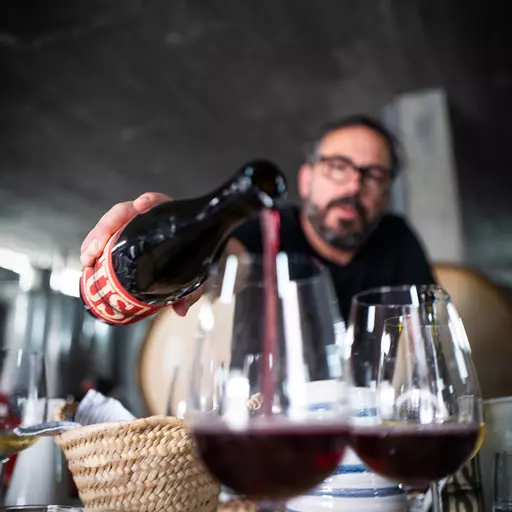By Max Driscoll
Sometimes, the best things come out of nowhere!
In November 2023, the Raymond Reynolds Ltd team visited the Alentejo to spend time with XXVI (26) Talhas around the Dia de São Martinho celebrations (St Martin’s Day, Nov 11th), to learn more about them as a producer and immerse ourselves in the local scene and culture.
We didn’t know it beforehand, but over the 3 days we spent in Vidigueira, we ended up meeting Hamilton Reis each day and tasting his wines in several circumstances; at a winemaker gathering at 26 Talhas, at the Rocim Amphora day, and even at Hamilton’s own winery. Hamilton spared us some time on this later occasion to show us round his winery and to taste through a few of his wines and vintages.
I think it’s safe to say that from the first tasting of the Natus white and red – which were stand outs among lots of great wines on our first evening – All of the Raymond Reynolds Ltd team knew how good they were and that they’d be perfect for our portfolio, we had to have these wines!
As it turns out, Hamilton is a long-established winemaker with big credentials. From a grape-growing/winemaking family, he started out with 3 different degrees, 2 of which are wine-related. He then gained winemaking experience at old-world and New-world wineries, including working with Luis Duarte. He was the head winemaker at Cortes de Cima for 14 years and is now head winemaker at Mouchão. The latter being a prestigious Alentejo winery, coincidentally founded by Raymond’s great grandfather and still owned and run by Raymond’s cousins.
After many years as a winemaker, though while still working at Cortes de Cima, Hamilton and his wife, Susana, originally both from Porto, decided to put down roots in Vidigueira, Alentejo. The origin of the name Vidigueira roughly means land of the vine, and Hamilton was drawn to the depth of cultural history related to winemaking.
Hamilton had a clear vision for his own project. He ultimately wanted to make wines that he enjoyed, making them in a way that respected traditional Alentejano methodology. He wanted to convey the character of indigenous grape varieties grown on his terroir, while respecting and maintaining the environment for the future.
Hamilton bought land on the outskirts of Vidigueira in 2008 and spent the next 10 years developing the site and improving the soil structure in preparation for planting his vines and building a home. The first Harvest came in 2020, and the first wines were released in 2022. Hamilton also buys some grapes from local, old vineyards he has sourced through being in the area so long, and getting to know what he wants. He only uses indigenous varieties, referring to other Portuguese varieties from other regions outside Alentejo as foreign.
When talking to Hamilton about his wines, it’s clear he has such a huge amount of knowledge and experience. But the surprising thing is that he constantly talks about what he knows NOT to do, as much as what he does do. Know more, do less!
That’s not to say he does nothing in the winery, but it’s so evident that so much thought goes into the whole process. From developing the land for 10 years before even starting, to managing his vines only as non-trellised bushes with careful pruning and canopy management, through to careful inclusion of a small amount of perfectly ripe stems and a little skin contact in his whites, pre-alcoholic fermentation, to give the impression of lifted freshness, even if acidity levels aren’t that high. And then Hamilton uses a combination of stainless steel, clay talhas (amphoras), and several types and sizes of wooden barrels, for both fermentation and ageing.
There are organic practices in the vineyard too, only a tiny amount of sulphites used in the winery, and no filtration before bottling. It’s all so carefully thought through, and all the little bits he does do are so purposeful.
We haven’t even mentioned Vidigueira’s micro-climate and its impact on seasonal temperatures and diurnal range yet, and that impact on ripening and acidity levels… Maybe that’s for another blog!?
That brings us to the final product. We consider ourselves very fortunate to have the Natus wines in the Raymond Reynolds Ltd portfolio. The Intus Branco and Tinto are more ‘everyday’, appealing, drinkable, though still impressive. Natus Tinto is complex, layered, taught. A thought-provoking wine that may well become an icon of the future. All are very gastronomic. The new 2023 Natus Branco will be arriving in late autumn. It’s bottled, but not quite ready for release yet. Another little detail Hamilton thinks about.
Oh, and there’s a surprise awaiting those curious enough to look for it…
For more information about Hamilton and his Natus Vini wines, click HERE.





















